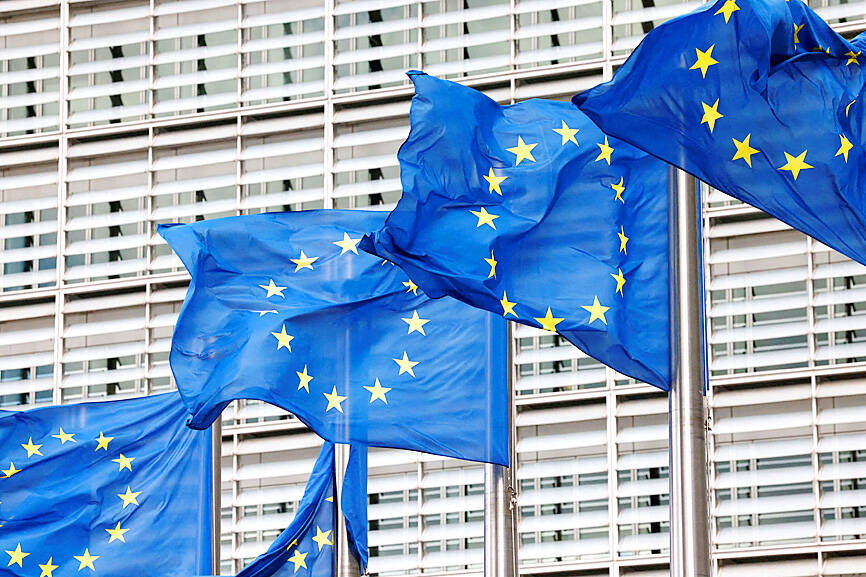Eurozone business activity made a surprise return to modest growth this month, adding to signs the downturn in the bloc may not be as deep as feared and that the currency union may escape recession, a survey showed.
S&P Global’s flash Composite Purchasing Managers’ Index (PMI), seen as a good gauge of overall economic health, climbed to 50.2 this month from 49.3 last month.
This month was the first time the index has been above the 50 mark, which separates growth from contraction, since June last year and the reading was ahead of the median Reuters poll forecast of 49.8.

Photo: Yves Herman, Reuters
“The survey undoubtedly brings welcome good news to suggest that any downturn is likely to be far less severe than previously feared and that a recession may well be avoided altogether,” S&P Global Market Intelligence chief business economist Chris Williamson said.
A mild winter so far, falling gas prices and recent positive economic data meant some quarterly growth forecasts in a Reuters poll published on Monday were upgraded although a technical recession was still predicted.
In a sign they are growing more optimistic, firms increased headcount at a faster rate this month. The employment index rose to a three-month high of 52.5 from 51.9 last month.
The PMI covering the bloc’s dominant services index also surprised to the upside, coming in at a six-month high of 50.7. It was at 49.8 last month and the Reuters poll had a forecast for 50.2.
Despite consumers facing large bills, demand only waned slightly. The new business index was just shy of the breakeven mark at 49.8, up from 48.4.
“The region is by no means out of the woods yet, however, as demand continues to fall — merely dropping at a reduced rate,” Williamson said.
Factory activity also showed an improvement but did still decline. The manufacturing PMI rose to 48.8 this month from 47.8, ahead of the 48.5 the Reuters poll forecast. An index measuring output which feeds into the composite PMI bounced to a seven-month high of 49.0 from 47.8.

Nissan Motor Co has agreed to sell its global headquarters in Yokohama for ¥97 billion (US$630 million) to a group sponsored by Taiwanese autoparts maker Minth Group (敏實集團), as the struggling automaker seeks to shore up its financial position. The acquisition is led by a special purchase company managed by KJR Management Ltd, a Japanese real-estate unit of private equity giant KKR & Co, people familiar with the matter said. KJR said it would act as asset manager together with Mizuho Real Estate Management Co. Nissan is undergoing a broad cost-cutting campaign by eliminating jobs and shuttering plants as it grapples

TEMPORARY TRUCE: China has made concessions to ease rare earth trade controls, among others, while Washington holds fire on a 100% tariff on all Chinese goods China is effectively suspending implementation of additional export controls on rare earth metals and terminating investigations targeting US companies in the semiconductor supply chain, the White House announced. The White House on Saturday issued a fact sheet outlining some details of the trade pact agreed to earlier in the week by US President Donald Trump and Chinese President Xi Jinping (習近平) that aimed to ease tensions between the world’s two largest economies. Under the deal, China is to issue general licenses valid for exports of rare earths, gallium, germanium, antimony and graphite “for the benefit of US end users and their suppliers

Dutch chipmaker Nexperia BV’s China unit yesterday said that it had established sufficient inventories of finished goods and works-in-progress, and that its supply chain remained secure and stable after its parent halted wafer supplies. The Dutch company suspended supplies of wafers to its Chinese assembly plant a week ago, calling it “a direct consequence of the local management’s recent failure to comply with the agreed contractual payment terms,” Reuters reported on Friday last week. Its China unit called Nexperia’s suspension “unilateral” and “extremely irresponsible,” adding that the Dutch parent’s claim about contractual payment was “misleading and highly deceptive,” according to a statement

The Chinese government has issued guidance requiring new data center projects that have received any state funds to only use domestically made artificial intelligence (AI) chips, two sources familiar with the matter told Reuters. In recent weeks, Chinese regulatory authorities have ordered such data centers that are less than 30 percent complete to remove all installed foreign chips, or cancel plans to purchase them, while projects in a more advanced stage would be decided on a case-by-case basis, the sources said. The move could represent one of China’s most aggressive steps yet to eliminate foreign technology from its critical infrastructure amid a